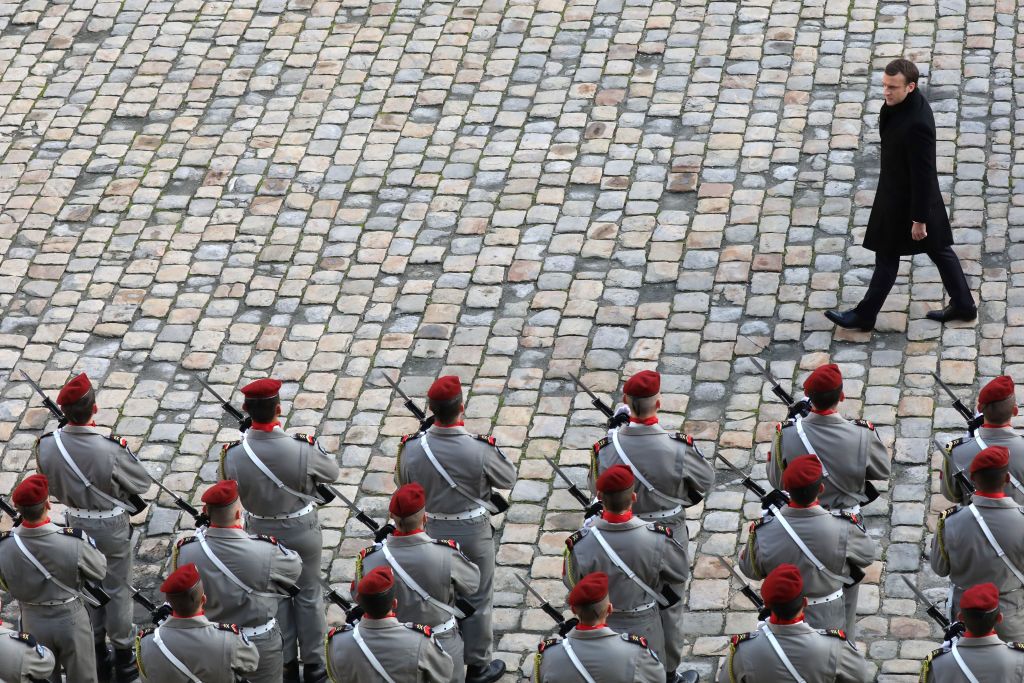Emmanuel Macron’s vow to press ahead with plans to bring back national service for France’s youth has taken many by surprise. The French president’s insistence that the scheme would be mandatory is also something of a shock, contradicting remarks made last week by Florence Parly, the minister of the armed forces, who appeared to suggest the service would be voluntary. Not so, according to a government spokesman, who said ‘it will be universal…and it will be obligatory’. So how has this announcement been greeted? In Britain, such news would inevitably be met with howls of outrage from certain quarters. In France, however, Macron’s plans have, for the most part, been greeted warmly.
Macron, the first president of the Fifth Republic with no military experience, has emphasised that the scheme would be different from the compulsory military training undertaken by generations of French teenagers that was phased out by president Jacques Chirac in the late 1990s. Rather, said Macron, the purpose will be to give the young ’causes to defend and battles to fight in the social, environmental and cultural domains’. Final details of the scheme will be released later in the year but it is expected that it will entail school-leavers enlisting in some sort of service for up to six months.
So far, most of the quibbles to the plans have been financial rather than political. The scheme will certainly be expensive: according to a government report, the annual cost of the Service National Universel (SNU) would be between £2.1bn and £2.6bn (2.4 and 3 billion euros) – hardly an insubstantial sum. The plans form part of the French government’s wider pledge to up defence spending by more than 40 per cent by 2025. President Trump, who last year criticised European countries for their lack of investment in defence spending, will be delighted, because it means the French defence budget will rise from 1.82 per cent of its GDP to the Nato target of two per cent.
France, it seems, is taking its military seriously after years of cuts. Its armed forces will now have the money to invest in more refuelling aircraft, better tanks and armoured personal carriers, new infantry equipment and a major upgrade of accommodation for service personnel and their families. So it appears that General Pierre de Villiers didn’t fall on his sword in vain. The chief of the defence staff resigned last summer in protest at defence cuts, which, over the course of a decade eroded the country’s military capacity and resulted in 60,000 redundancies. Six thousand civilian and military posts will be created between now and 2015 2025, half of which will be in cyberdefence and intelligence.
Yet a feature of both the defence spending hike and the introduction of the SNU is that they have raised little objection from the left. Curiously, one of the few subjects that united Macron, the National Front’s Marine Le Pen and the far-left’s Jean-Luc Mélenchon during their presidential campaigning last year was their support for the return of national service.
What political criticism there has been has come from the right, which sees Macron once more encroaching on its territory. Annie Genevard, an MP with the centre-right Républicains, accused the government of a lack of clarity, saying ‘one can well see that the thing hasn’t been thought through’; while the conservative magazine, Valeurs Actuelles, ran an interview with defence expert Bénédicte Chéron. In his opinion, the SNU is ‘problematic’ for the French military because they will be expected to participate in a programme that is more ‘a vast socio-educative exercise’ than a military one. In an era when they are stretched home and abroad, mainly in the fight against Islamic extremism, they have more important things to do with their time than nursemaid teenagers.







Comments